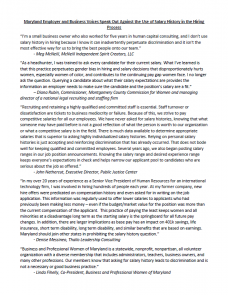 “I’m a small business owner who also worked for five years in human capital consulting, and I don’t use salary history in hiring because I know it can inadvertently perpetuate discrimination and it isn’t the most effective way for us to bring the best people onto our team.”
“I’m a small business owner who also worked for five years in human capital consulting, and I don’t use salary history in hiring because I know it can inadvertently perpetuate discrimination and it isn’t the most effective way for us to bring the best people onto our team.”
– Meg McNeill, McNeill Independent Spirit Creators, LLC
“As a headhunter, I was trained to ask every candidate for their current salary. What I’ve learned is that this practice perpetuates gender bias in hiring and salary decisions that disproportionately hurts women, especially women of color, and contributes to the continuing pay gap women face. I no longer ask the question. Querying a candidate about what their salary expectations are provides the information an employer needs to make sure the candidate and the position’s salary are a fit.”
– Diana Rubin, Commissioner, Montgomery County Commission for Women and managing director of a national legal recruiting and staffing firm
“Recruiting and retaining a highly qualified and committed staff is essential. Staff turnover or dissatisfaction are tickets to business mediocrity or failure. Because of this, we strive to pay competitive salaries for all our employees. We have never asked for salary histories, knowing that what someone may have paid before is not a good reflection of what the person is worth to our organization or what a competitive salary is in the field. There is much data available to determine appropriate salaries that is superior to asking highly individualized salary histories. Relying on personal salary histories is just accepting and reinforcing discrimination that has already occurred. That does not bode well for keeping qualified and committed employees. Several years ago, we also began posting salary ranges in our job position announcements. Knowing the salary range and desired experience range keeps everyone’s expectations in check and helps narrow our applicant pool to candidates who are serious about the job as offered.”
– John Nethercut, Executive Director, Public Justice Center
“In my over 20 years of experience as a Senior Vice President of Human Resources for an international technology firm, I was involved in hiring hundreds of people each year. At my former company, new hire offers were predicated on compensation history and even asked for in writing on the job application. This information was regularly used to offer lower salaries to applicants who had previously been making less money – even if the budget/market value for the position was more than the current compensation of the applicant. This practice of paying the least keeps women and all minorities at a disadvantage long term as the starting salary is the springboard for all future pay changes. In addition, there are larger implications as base pay has an impact on 401k savings, life insurance, short term disability, long term disability, and similar benefits that are based on earnings. Maryland should join other states in prohibiting the salary history question.”
– Denise Messineo, Thallo Leadership Consulting
“Business and Professional Women of Maryland is a statewide, nonprofit, nonpartisan, all volunteer organization with a diverse membership that includes administrators, teachers, business owners, and many other professions. Our members know that asking for salary history leads to discrimination and is not a necessary or good business practice.”
– Linda Fihelly, Co-President, Business and Professional Women of Maryland

